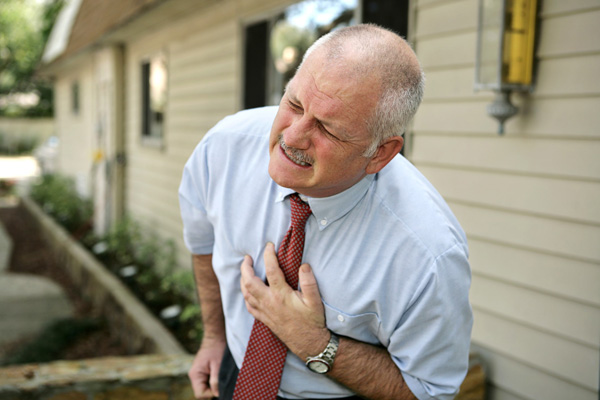Blog Post
Learning about behavioural emergencies during first aid training

Behavioural emergencies, also known as psychiatric emergencies or behavioural crises, takes place when an individual, or group's, behaviour is out of control to the point where they pose danger to those around them. In this situation, the individual or group affected must be treated quickly to avoid any injury to themselves or those around them. During our level 3 first aid training course, participants will learn how to address and deal with behavioural emergencies, as well as how to recognise them in order to prevent unfortunate accidents or injuries. In just a few minutes of reading, find out more about psychiatric emergencies as well as what will be addressed in our level 3 first aid training course on the matter.
More about behavioural emergencies
It is well known that when it comes to psychiatric emergencies, time truly is of the essence. It is extremely important for those experienced in first aid training to be able to recognise the symptoms of this genre of emergency, so they are able to de-escalate the crisis and take the necessary steps to diffuse the situation - if at all possible. Some symptoms of behavioural emergencies that first aid training participants will come to recognise include the following:
- Agitation
- Shouting or screaming
- Irrational thoughts and comments
- Threats to harm oneself or others
- Throwing objects
- Unpredictability
- General volatile behaviour
The fact that this type of emergency can be rather unpredictable in nature means that bystanders are often injured as a result, in the event that sufferers lash out with violent behaviour during the psychiatric episode.
Why do behavioural emergencies occur?
Most behavioural crises arise as a result of underlying mental illness or substance abuse. Other medical conditions can also be blamed for these emergencies, such as low blood sugar to do with diabetes or hypoglycaemia or hypoxia - which is a traumatic brain injury. Central nervous system infections such as meningitis as well as general reduced blood flow to the brain can also be blamed. These medical conditions are capable of causing the type of mental changes that lead to psychiatric emergencies.
Most professionals insist that all explanations to do with potential physical medical conditions, as well as substance abuse, must be ruled out long before behavioural crises can be blamed on a mental illness. This is particularly applicable to a sufferer who has never been diagnosed with a mental illness or has no history of other symptoms. Sudden-onset mental changes are usually accompanied by excessive salivation, visual or auditory hallucinations, memory loss or incontinence - however, physical hallucinations are more commonly caused by physical illnesses rather than those of the mental category.
The role of anxiety in behavioural emergencies
One common mental condition that contributes, or directly leads to psychiatric emergencies, is anxiety. Around 10% of all adults suffer from anxiety - which makes it the most prevalent psychiatric illness out there. Even though the key symptoms of anxiety are considerably easy to recognise, it is more often than not misdiagnosed. People who suffer from anxiety may experience panic attacks, which comprises intense episodes of extreme tension and fear that can rapidly overwhelm an individual and lead to a psychiatric emergency.
During these episodes, the person suffering may lose the ability to rationalise feelings as well as the body's responses to those feelings. Some other symptoms of a panic attack include:
- Heart palpitations
- Irregular heartbeat
- Dizziness
- Uncontrollable shaking
- Numbness or tingling of fingers and mouth
- Shortness of breath

Should sufferers of anxiety learn to recognise the symptoms of an oncoming panic attack before symptoms escalate, the individual may be able to avoid a psychiatric emergency. However, anxiety is certainly not the only medical condition that prompts behavioural crises. Illnesses such as bipolar disorder, depression as well as schizophrenia can all create symptoms overwhelming enough to cause the sufferer to experience a behavioural crisis. This is especially likely if the underlying conditions have not yet been diagnosed or treated - or if the individual concerned suddenly stops taking their medication.
Behavioural emergencies and violence
Perhaps the biggest danger posed by behavioural crises is the risk of harm to the sufferer or bystanders. Roughly 70% of people who experience a psychiatric emergency attempt to assault bystanders, or at least display behaviour that can harm others. As a result, when it comes to this type of emergency, participants of first aid training will come to know that the safety of everyone involved in the situation is the number one priority. Next, attempts to diffuse the situation should be enacted, as well as encouraging treatment for the one suffering so as to avoid a future psychiatric emergency.
There are a number of reasons why people become violent while experiencing a behavioural emergency, such as the presence of a perceived - or real- threat, panic and fear, the influence of a substance or head trauma. Some warning signs of impending violence include:
- Shouting
- A person making threats
- Pacing
- Clenched fists or teeth

These indicators should always be taken seriously, as participants of first aid training will know well after completing their course. Should these signs be overlooked, there can be significant results, and in many cases, fatal ones. There are several ways that sufferers of psychiatric emergencies can become violent, such as throwing objects at others, direct physical violence, violence with a weapon or simply the threat of violence. Although the first instinct may be to help the sufferer in this case, both personal safety and the safety of bystanders should be the first priorities.
Techniques to deal with behavioural emergencies
During certain first aid training courses offered by EMCARE, participants will learn a number of methods that will prepare them to safely address psychiatric emergency situation. The most important thing when confronted with this type of emergency is to remain calm. Fear and uneasiness only serves to exacerbate the situation, and increase the sufferer's agitation and panic. Many experts advise first responders to speak directly to the sufferer, and in doing so, create and maintain eye contact while at the same time speaking reassuringly.
Making sudden movements can often be misinterpreted by the sufferer, so it is to be avoided, and it is widely believed by the medical community that responders should initially keep some distance between themselves and the individual experiencing the psychiatric emergency. However, despite the space, responders must remain with the individual at all times. When addressing the sufferer, remaining honest and answering questions truthfully is considered to be of the utmost importance. Should the sufferer be having hallucinations, experts warn to not tell the individual that you too can see them in an attempt to create solidarity.Making sudden movements can often be misinterpreted by the sufferer, so it is to be avoided, and it is widely believed by the medical community that responders should initially keep some distance between themselves and the individual experiencing the psychiatric emergency. However, despite the space, responders must remain with the individual at all times. When addressing the sufferer, remaining honest and answering questions truthfully is considered to be of the utmost importance. Should the sufferer be having hallucinations, experts warn to not tell the individual that you too can see them in an attempt to create solidarity.

In addition, the sufferer should not be encouraged to make any decisions - instead, the responder should remain supportive and refrain from being accusatory in any way. Experts advise that one good way to keep the individual present is to ask them to perform simple and unimportant tasks. This may very well prevent them from becoming lost in hallucinations or delusions.
A stressful scenario
Psychiatric emergencies are undoubtedly stressful for everyone involved. These crises are not uncommon, however, which is why we at EMCARE offer first aid training courses that include ways in which to deal with these types of emergencies. Remaining calm, and attempting to keep the sufferer calm can make a significant difference to the outcome of the situation. After the incident, the individual is likely to require treatment - either to recuperate from an underlying physical condition, or alternatively to be diagnosed and treated for substance abuse problems or mental illness. Treatment is essential to reducing the chances of a second emergency.
Other conditions linked to behavioural emergencies
We have already discussed the way in which anxiety and substance abuse may contribute towards the occurrence of a behavioural emergency, but participants of the relevant first aid training courses will also come to know several other medical conditions that can result in psychiatric emergencies. Some of these conditions include:
-
Psychosis
Individuals who experience psychotic symptoms are likely to experience psychiatric emergencies in certain settings. Psychosis is a severe mental disorder, which incites emotions and thoughts in the sufferer to become extremely impaired, and ultimately contact is lost with external reality. In fact, acute cases of psychosis on their own are considered behavioural emergencies - which stands to show how severe the condition can be. Because psychosis is a complex condition, diagnosing it often includes obtaining neuroimages, conducting psychological testing and a mental status evaluation, as well as capturing other neurophysiologic measurements. Ultimately, a lack of diagnosis and treatment can result in homicide, suicide, or other types of violence commonly exhibited in psychiatric emergencies.
-
Hazardous drug interactions and reactions
Drug interactions, overdoses, and severe reactions from psychiatric medications (particularly antipsychotics) are also classified as psychiatric emergencies. Drug interactions occur when incompatible medications are taken in conjunction, whereas reactions take place when the body mistakenly identifies a drug as a harmful substance. These interactions and reactions often lead to an individual experiencing a psychiatric emergency.
-
Personality disorders
Many experts allege that people suffering from personality disorders usually do not complain about symptoms, which is why diagnosing them can oftentimes be tricky. Personality disorders include most disorders that lead to a dysfunction in the areas of the mind related to interpersonal functioning, impulse control, cognition and affectivity. Sufferers experiencing behavioural emergencies as a result of a personality disorder may exhibited suspicious or combative behaviour, as well as suffer from delusions or brief psychotic episodes.
-
Disasters
A lesser-known cause of behavioural emergencies is disasters, both those of natural or man-made causes. This is because they can evoke severe psychological stress in victims near the event. Disasters can cause victims to experience shock, confusion, panic or immobilisation. Whether it be hours, days, months and even years after the event, those involved often experience tormenting memories, may develop apathy, memory lapses, insomnia, depression, panic attacks, dysphoria, withdrawal or loss of appetite. After a disaster has occurred, mental health responders usually assess and treat patients as quickly as possible. However, basic survival considerations as well as physical injuries are usually treated first.
-
Abuse
Victims of sexual abuse, rape, emotional or physical abuse can often experience psychiatric emergencies after the event. They may also experience extreme anxiety, helplessness, sleeping or eating disorders, guilt, shame, confusion and hostility. Properly managing a response usually includes the coordination of medical, legal and psychological considerations. Experiencing these forms of abuse can take a huge toll on victims that may affect them for years to come, and in many cases - life. Reminders of the incident may incite behavioural emergencies, especially when victims feel vulnerable.
Learning about behavioural emergency in EMCARE's first aid training level 3 course
The level 3 first aid training course is an advanced training program that takes place over 4 days and provides participants with certification valid for 3 years. It is the highest level of first aid training that can be achieved, so participants should be ready to absorb a lot in a short amount of time. Completing this course will get you one step further in becoming completely prepared to deal with psychiatric emergencies.
GET IN TOUCH
There are a few ways to reach us below. Please feel free to contact us via phone, email or you can send us a message via the form provided and we will get back to you.




















